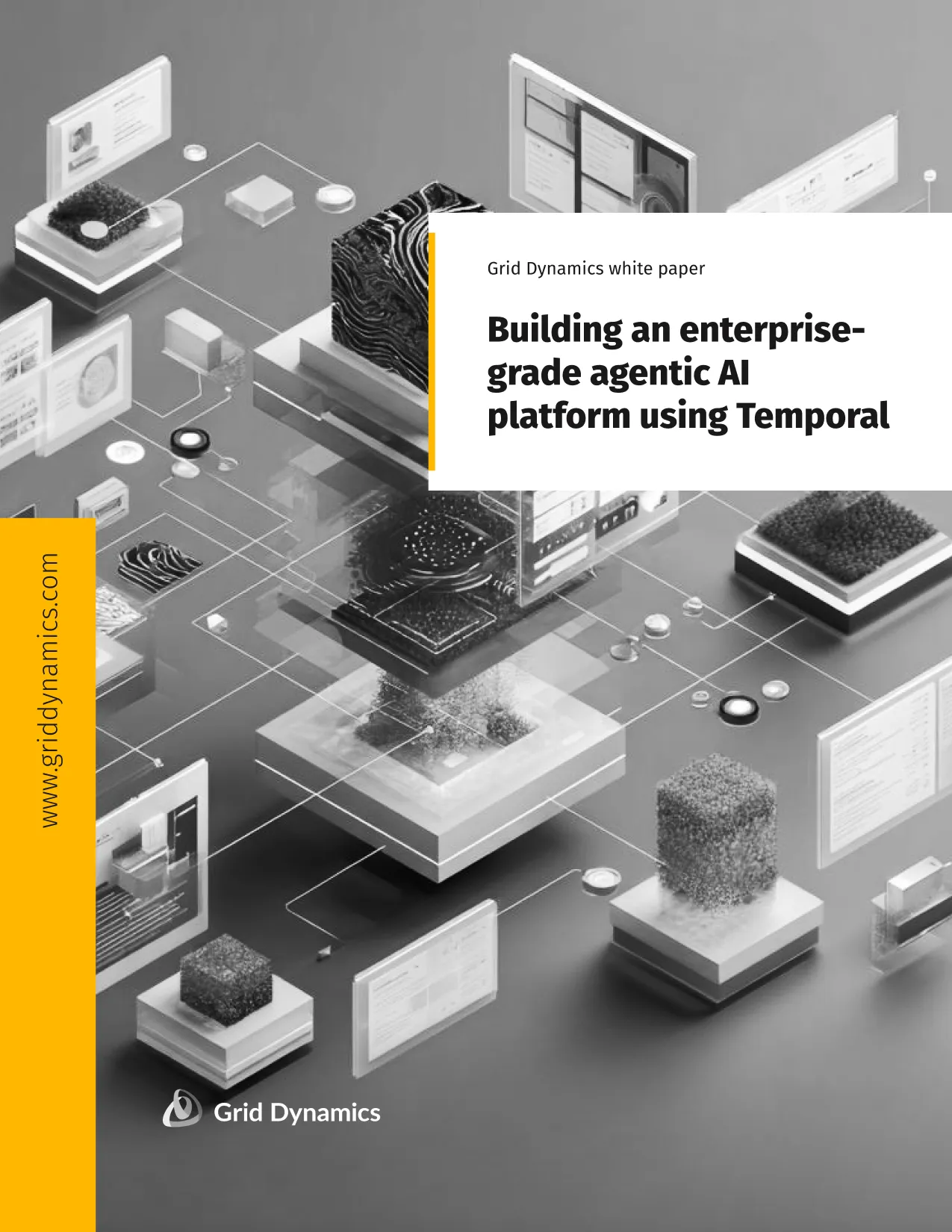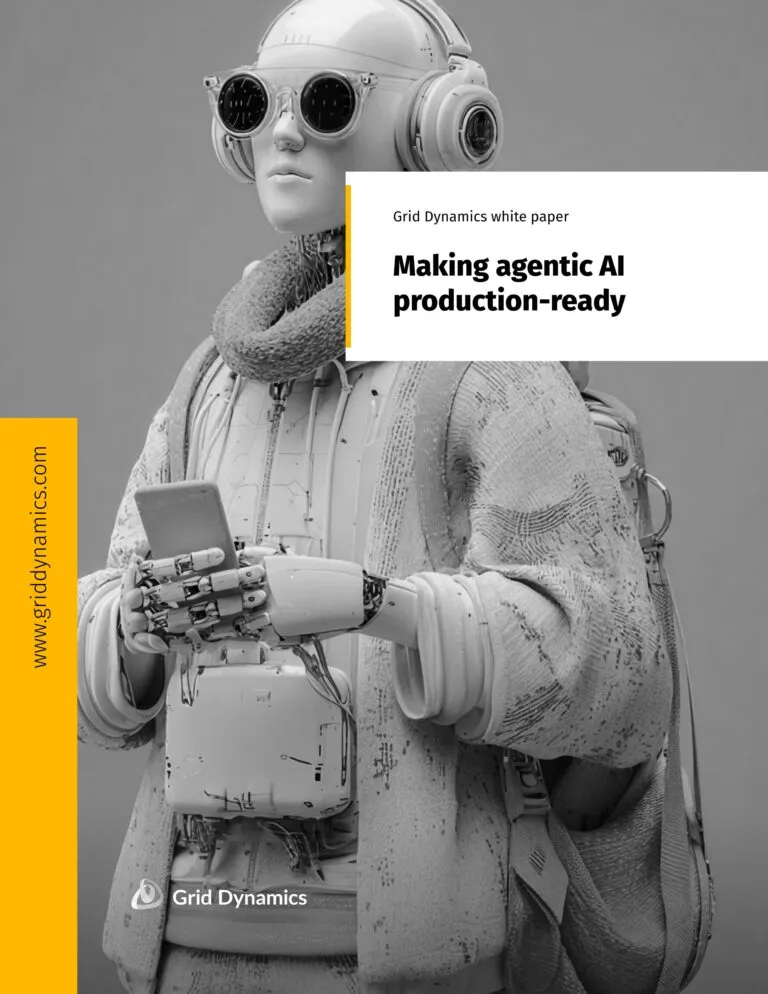Ilya Katsov
Chief Technology Officer, Americas, AI/ML and Data Analytics
Ilya Katsov joined Grid Dynamics in 2009 to lead data-related consulting practices and major client engagements. He currently spearheads technology innovation, driving the ideation, development, and market launch of AI-centric solutions for supply chain, smart manufacturing, robotics, and customer experience. Before joining Grid Dynamics, Ilya worked at Intel Research, focusing on emerging wireless communication technologies. He is the author of two books on enterprise AI and holds multiple scientific publications and international patents.
Check out the latest insights

The Manufacturing Scheduler converts complex production planning into a digital-twin-validated, data-driven process. This intelligent system analyzes factory layouts, detects available resources, and generates optimal schedules that minimize idle time and balance workloads across CNC machines, 3D p...

Turn your CCTV feeds into actionable insight. The AI-powered visual process monitoring system detects, tracks, and explains real-world events, enabling loss prevention teams to act quickly without wading through noise. Define what matters (zones, objects, behaviors), and alerts arrive in context yo...

See how the Grid Dynamics AI‑Native (GAIN) SDLC Platform takes AI‑enabled software delivery to the next level of developer productivity. While AI‑enabled SDLC speeds up coding and testing, without clearly defined requirements, the real bottlenecks simply move upstream. Skill gaps compound the probl...

Running agent-based systems across your enterprise comes with tough problems. The main ones are keeping costs down, scaling up fast, and making sure nothing breaks when things go wrong. This white paper gets into the real challenges that come up when teams move from simple agent pilots to a ful...

Robotics inspection systems, like the one we developed in partnership with SmartRay, address the costly and time-consuming inefficiencies related to complex robotic operations in manufacturing. With SmartRay’s AI robotic inspection platform, you can automate optimized toolpaths for inspection in mi...
Is DeepSeek AI development the right choice for your organization? Download the full white paper to get your hands on comprehensive technical details, in-depth performance benchmarks, and actionable insights from CTOs—for CTOs (and AI innovators). DeepSeek has quickly established itsel...
For technical leaders seeking a comprehensive understanding of Agentic AI technology—including architectural innovations, implementation frameworks, and detailed technical guidance—download the full white paper for an in-depth analysis, technical deep dive, and actionable strategies to accelera...
It's time to optimize your enterprise with adaptive, AI-driven automation. Download our complete white paper to discover how Agentic AI can drive operational efficiency, enhance customer experience, and boost revenue growth, along with practical guidelines, implementation strategies, and tool com...

Demand forecasting is a crucial aspect of retail supply chain management that involves predicting future customer demand to make informed decisions about inventory levels, production, and resource allocation. It is a statistical analysis that considers numerous variables to optimize the predict...

Building solutions using closed-source large language models (LLMs), including models like GPT-4 from OpenAI, or PaLM2 from Google, is a markedly different process to creating private machine learning (ML) models, so traditional MLOps playbooks and best practices might appear irrelevant when appl...

Discover the transformative potential of Generative Artificial Intelligence (GenAI) in the software development industry. At Grid Dynamics, we've conducted an extensive study to quantitatively assess the performance enhancements provided by GenAI tools across various software development tasks and...

The quality of various strategic and tactical decisions, such as capacity planning, supplier selection, and inventory ordering, directly influences the efficiency and resilience of a supply chain. Limited visibility into various stages of the supply chain, insufficient data availability, and lack...

Automated visual quality control (VQC) is a critically important capability for many manufacturers because it helps to dramatically reduce quality control costs, waste, return rates, and reputation damage. Modern computer vision technologies make it relatively easy to develop custom VQC solutions...

Traditional product design can be a complex and challenging process, requiring multiple stages of ideation, modification, restyling, 3D modeling, prototyping, and testing. One of the main challenges is finding the balance between creative freedom and practical constraints, such as cost, manufactura...

Inventory optimization encompasses the process of determining the optimal level of inventory to hold that balances the cost of holding the inventory with the cost of inventory stockouts. Holding too much inventory can lead to increased storage costs, spoilage, and poor turnover metrics. On the...
In game development, the costs associated with creating art assets are often estimated to be about 30-40% of the total game budget. This makes game asset creation one of the most important applications for generative AI tools and services. In this blog post, we explore the capabilities of Midjourne...

The effectiveness and efficiency of quality control processes are among the top concerns for most manufacturing companies, and are also important considerations in logistics, agriculture, and other verticals. Over the last decade, visual quality control automation using computer vision has proved t...

Order sourcing decisions can be defined as the logistics decisions related to how customer orders and internal inventory requisitions are fulfilled: what nodes (warehouses, distribution centers, stores, etc.) the inventory should be sourced from, what carriers should be used to ship it, what sh...

Originally published on the AWS Partner Network blog Conveyor belts are an essential material handling tool for various industrial processes, and one of the most effective ways to quickly and continuously transport large amounts of materials or products. However, high throughput rates make i...

A company’s ability to generate a steady flow of new customers, and retain existing customers at the same time, can decisively determine whether a business is successful or not. Customer retention is particularly important because the cost of user acquisition is much higher than the cost of user re...

Modern manufacturing, transportation, and energy companies routinely operate thousands of machines and perform hundreds of quality checks at different stages of their production and distribution processes. Industrial sensors and IoT devices enable these companies to collect comprehensive real-t...

Do you feel well-equipped when it comes to data-driven personalization? A recent McKinsey survey of data leaders found that only 15% believe their company is on the right track with personalization. Read this whitepaper to explore the new generation of Customer Analytics and Personalization sol...

With a new AWS-based solution, Grid Dynamics significantly improved the performance of this top tier agency's advertising efforts which allowed them to enhance their business. Publishers were able to manage the cost of their ads space by defining a more specific audience which would later be sold b...

ITOps is at the heart of today’s enterprise technology innovation teams. Often, they’re tasked with overseeing complex and diverse IT environments and face unprecedented challenges due to the volume and variety of data they encounter. In this white paper, we explore how an effective AIOps...

To improve the gaming experience for players, a leading video game publisher sought to personalize in-game interactions, streamline model development, and increase long-term engagement and lifetime value (LTV) of users. Grid Dynamics addressed these challenges by implementing a reinforcement learni...

To optimize promotions across various channels and countries, a video game publisher encountered challenges in accurately forecasting demand 24 months ahead and effectively managing new game releases. Grid Dynamics addressed these issues by developing robust demand forecasting models and what-if an...

A global industrial technology leader in transportation and mobility faced multimillion-dollar annual losses from fuel distribution challenges, including leaks, theft, and meter inaccuracies. By deploying a cloud-native AWS analytics platform in just seven days, the company implemented AI-powered a...
The modern manufacturing industry is almost miraculous in how it manages so many moving components at a predictable and reliable cadence. However, despite this obsession with perfection, anomalies have a way of creeping in. Technical failures, human error, and other discrepancies can lead to sig...

Customer retention is the primary pillar for building virtually any subscription-based business, including software, video game, media, and telecom businesses. Nowadays, it is common to use advanced machine learning techniques to predict customer churn probability as accurately as possible. However...

Personalization and recommendation models are widely adopted by technology and entertainment companies as highly efficient tools for digital experience improvement and conversion optimization. The traditional model development and productization process, however, requires significant engineering ef...
Forecasting is ubiquitous in modern enterprise operations — a wide range of tasks, from inventory management and price optimization to workforce allocation and equipment maintenance, cannot be efficiently performed without data-driven forecasting. In many of these applications, one needs to not...

Supply chain optimization is one the toughest challenges among all enterprise applications of data science and ML. This challenge is rooted in the complexity of supply chain networks that generally require to optimize decisions for multiple layers (echelons) of distribution centers and suppliers, m...

This report is based on a survey of marketing, merchandising, and pricing directors and executives and aims to assess their priorities, challenges, and plans with regard to decision automation in the area of revenue management. The main topics of this study include the following: What are the...
Evolving beyond a mere tech advantage, artificial intelligence (AI) has gone a long way to cement itself as a mainstay of modern-day retail. In other words, ai solutions for enterprises are a competitive necessity for retail. Designed to assist business and technology executives in understanding an...

In this white paper, we provide practical recommendations to technology and business leaders on how advanced data analytics and engineering capabilities can be leveraged to rapidly and efficiently respond to the COVID-19 disruption. These recommendations are largely based on early examples of respo...
A robust pricing strategy that aligns with market trends is perhaps the most crucial competitive differentiator today. In this white paper, we introduce you to how an advanced price intelligence platform enables businesses to automate their pricing and promotion strategy with unparalleled analytica...
In an era where customer data offers valuable insights into user behavior and action, understanding and leveraging this data is crucial for business success. The field of marketing analytics—from its nascent days of predictive analytics to the modern-day marvels of machine learning—charts the journ...

The COVID-19 crisis is clearly the biggest economic disruption the world has seen in the 21st century. This disruption impacts virtually all industries and all areas of enterprise operations through market demand, supply chain, and human capital. The adverse impact of the COVID-19 pandemic and p...

Personalization and recommendation algorithms have been around for many decades, and basic methods such as look-alike modeling and collaborative filtering are widely understood and adopted across the industry. The advancement of deep learning greatly expands the toolkit available to developers of p...

Supply chain and price management were among the first areas of enterprise operations that adopted data science and combinatorial optimization methods and have a long history of using these techniques with great success. Although a wide range of traditional optimization methods are available for in...
Marketers usually use multiple channels–such as sponsored search, display ads, and emails–to reach their customers, and each channel usually includes multiple activities or has multiple parameters that are associated with various costs. For example, a marketer can run several email campaigns, each...

Modern customer analytics and personalization systems use a wide variety of methods that help to reveal and quantify customer preferences and intent, making marketing messages, ads, offers, and recommendations more relevant and engaging. However, most of these methods are designed to optimize only...

Speed of delivery is one of the key success factors in online retail. Retailers fiercely compete with each other in this space, implementing new order fulfillment options such as Same-Day Shipping, Buy Online Pick Up in Store (BOPUS) and Ship from Store (SFS). These capabilities help to both improv...
Price setting is one of the most important problems in retail because any price setting error directly results in lost profit. However, traditional price management methods almost never achieve optimal pricing because they are designed for traditional environments, where the frequency of price chan...

Pricing is one of the key factors that drives a successful retail business model, and it is also one of the most difficult to manage. Retailers made lots of improvements on their pricing strategies over the last decade, moving from cost plus or value pricing to modern day AI-driven price management...

This is the third post in a series of articles on AI/ML-based decision automation in retail price management, this time focusing on implementation and technology. The automation of pricing decisions is a challenging task that requires a software system to understand business objectives and constrai...

AI-based decision automation is particularly beneficial when a large number of decisions must be made in near real time and need to take a wide range of signals into account. Additionally, these decision-making components have to be aligned with the pricing strategy and integrated into the price...

AI has great potential to transform or even disrupt enterprise operations, and price management is among the most important business functions that directly affect enterprise profitability and efficiency. The impact of artificial intelligence (AI) technologies on the price management process is not...

Pricing decisions are critically important for any business, as pricing is directly linked to consumer demand and company profits. Even a slightly suboptimal decision-making process inevitably leads to tangible losses, and major mistakes can have grave consequences. Optimal pricing is a challeng...















